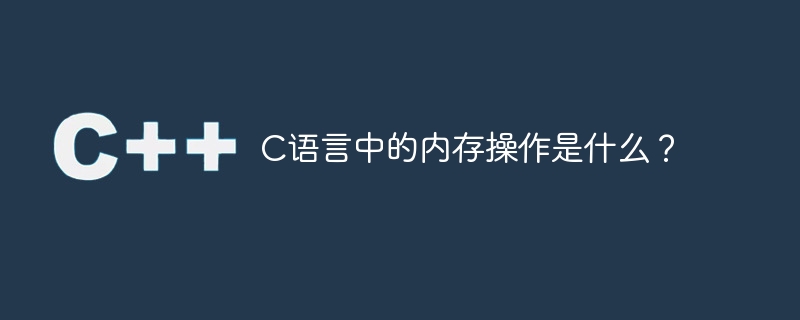What are memory operations in C language?

Library #include
These memory operations are as follows:
| In the buffer Search characters in . | |
| Compare two buffers. | |
| Copy one buffer to another buffer. | |
| Move a certain number of bytes from one buffer to another . | |
| Sets all bytes of the buffer to the given characters. |
| Copy characters (bytes) | |
| Copy integer array |
memmove() behaves in exactly the same way as memcpy() except, that the source and destination locations may overlap.
memcmp() is similar to strcmp() except here, unsigned bytes are compared and returns less than zero if si is less than s2 etc.
The above is the detailed content of What are memory operations in C language?. For more information, please follow other related articles on the PHP Chinese website!char src[SIZE], dest[SIZE];
int isrc[SIZE], idest[SIZE];

Hot AI Tools

Undresser.AI Undress
AI-powered app for creating realistic nude photos

AI Clothes Remover
Online AI tool for removing clothes from photos.

Undress AI Tool
Undress images for free

Clothoff.io
AI clothes remover

Video Face Swap
Swap faces in any video effortlessly with our completely free AI face swap tool!

Hot Article

Hot Tools

Notepad++7.3.1
Easy-to-use and free code editor

SublimeText3 Chinese version
Chinese version, very easy to use

Zend Studio 13.0.1
Powerful PHP integrated development environment

Dreamweaver CS6
Visual web development tools

SublimeText3 Mac version
God-level code editing software (SublimeText3)

Hot Topics
 1653
1653
 14
14
 1413
1413
 52
52
 1306
1306
 25
25
 1251
1251
 29
29
 1224
1224
 24
24
 C++ object layout is aligned with memory to optimize memory usage efficiency
Jun 05, 2024 pm 01:02 PM
C++ object layout is aligned with memory to optimize memory usage efficiency
Jun 05, 2024 pm 01:02 PM
C++ object layout and memory alignment optimize memory usage efficiency: Object layout: data members are stored in the order of declaration, optimizing space utilization. Memory alignment: Data is aligned in memory to improve access speed. The alignas keyword specifies custom alignment, such as a 64-byte aligned CacheLine structure, to improve cache line access efficiency.
 What are the best practices for memory allocation in Java functions?
May 02, 2024 pm 10:33 PM
What are the best practices for memory allocation in Java functions?
May 02, 2024 pm 10:33 PM
Best practices for memory allocation in Java functions include using automatic memory management and ensuring that appropriate GC algorithms are used. Monitor memory allocation patterns and identify memory leaks or bottlenecks. Use object pooling to reuse objects of similar size. Avoid large numbers of short-lived allocations and consider using alternatives. Use the Null Object pattern to avoid creating unnecessary objects. Explicitly release native resources, ensuring memory that is not accessible to JavaGC is released.
 C++ Memory Management: Custom Memory Allocator
May 03, 2024 pm 02:39 PM
C++ Memory Management: Custom Memory Allocator
May 03, 2024 pm 02:39 PM
Custom memory allocators in C++ allow developers to adjust memory allocation behavior according to needs. Creating a custom allocator requires inheriting std::allocator and rewriting the allocate() and deallocate() functions. Practical examples include: improving performance, optimizing memory usage, and implementing specific behaviors. When using it, you need to pay attention to avoid freeing memory, manage memory alignment, and perform benchmark tests.
 Challenges and countermeasures of C++ memory management in multi-threaded environment?
Jun 05, 2024 pm 01:08 PM
Challenges and countermeasures of C++ memory management in multi-threaded environment?
Jun 05, 2024 pm 01:08 PM
In a multi-threaded environment, C++ memory management faces the following challenges: data races, deadlocks, and memory leaks. Countermeasures include: 1. Use synchronization mechanisms, such as mutexes and atomic variables; 2. Use lock-free data structures; 3. Use smart pointers; 4. (Optional) implement garbage collection.
 Reference counting mechanism in C++ memory management
Jun 01, 2024 pm 08:07 PM
Reference counting mechanism in C++ memory management
Jun 01, 2024 pm 08:07 PM
The reference counting mechanism is used in C++ memory management to track object references and automatically release unused memory. This technology maintains a reference counter for each object, and the counter increases and decreases when references are added or removed. When the counter drops to 0, the object is released without manual management. However, circular references can cause memory leaks, and maintaining reference counters increases overhead.
 Memory allocation analysis of golang function
Apr 29, 2024 pm 02:24 PM
Memory allocation analysis of golang function
Apr 29, 2024 pm 02:24 PM
Question: How to analyze the memory allocation of a Go function? Answer: Use the heapprofile function in the pprof package to generate a heap dump. Analyze the heap dump to determine the type and size of the allocation. Detailed description: Generate a heap dump: enable the heap profiler and call the heapprofile function. Analyze the heap dump: Use the gotoolpprof command to analyze the heap dump file to view allocation information.
 How to manage memory usage in PHP functions?
Apr 26, 2024 pm 12:12 PM
How to manage memory usage in PHP functions?
Apr 26, 2024 pm 12:12 PM
To manage memory usage in PHP functions: avoid declaring unnecessary variables; use lightweight data structures; release unused variables; optimize string processing; limit function parameters; optimize loops and conditions, such as avoiding infinite loops and using indexed arrays .
 Memory management of golang functions and goroutine
Apr 25, 2024 pm 03:57 PM
Memory management of golang functions and goroutine
Apr 25, 2024 pm 03:57 PM
Memory for functions in Go is passed by value and does not affect the original variable. Goroutine shares memory, and its allocated memory will not be reclaimed by GC until Goroutine completes execution. Memory leaks can occur by holding a completed Goroutine reference, using global variables, or avoiding static variables. To avoid leaks, it is recommended to cancel Goroutines through channels, avoid static variables, and use defer statements to release resources.




